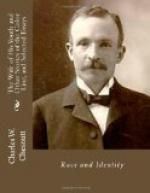When she had grown somewhat calmer, the sheriff left her standing there and went back into the cell. The prisoner’s arm was bleeding from a flesh wound. His bravado had given place to a stony apathy. There was no sign in his face of fear or disappointment or feeling of any kind. The sheriff sent Polly to the house for cloth, and bound up the prisoner’s wound with a rude skill acquired during his army life.
“I ’ll have a doctor come and dress the wound in the morning,” he said to the prisoner. “It will do very well until then, if you will keep quiet. If the doctor asks you how the wound was caused, you can say that you were struck by the bullet fired from the woods. It would do you no good to have it known that you were shot while attempting to escape.”
The prisoner uttered no word of thanks or apology, but sat in sullen silence. When the wounded arm had been bandaged, Polly and her father returned to the house.
The sheriff was in an unusually thoughtful mood that evening. He put salt in his coffee at supper, and poured vinegar over his pancakes. To many of Polly’s questions he returned random answers. When he had gone to bed he lay awake for several hours.
In the silent watches of the night, when he was alone with God, there came into his mind a flood of unaccustomed thoughts. An hour or two before, standing face to face with death, he had experienced a sensation similar to that which drowning men are said to feel—a kind of clarifying of the moral faculty, in which the veil of the flesh, with its obscuring passions and prejudices, is pushed aside for a moment, and all the acts of one’s life stand out, in the clear light of truth, in their correct proportions and relations,—a state of mind in which one sees himself as God may be supposed to see him. In the reaction following his rescue, this feeling had given place for a time to far different emotions. But now, in the silence of midnight, something of this clearness of spirit returned to the sheriff. He saw that he had owed some duty to this son of his,—that neither law nor custom could destroy a responsibility inherent in the nature of mankind. He could not thus, in the eyes of God at least, shake off the consequences of his sin. Had he never sinned, this wayward spirit would never have come back from the vanished past to haunt him. As these thoughts came, his anger against the mulatto died away, and in its place there sprang up a great pity. The hand of parental authority might have restrained the passions he had seen burning in the prisoner’s eyes when the desperate man spoke the words which had seemed to doom his father to death. The sheriff felt that he might have saved this fiery spirit from the slough of slavery; that he might have sent him to the free North, and given him there, or in some other land, an opportunity to turn to usefulness and honorable pursuits the talents that had run to crime, perhaps to madness; he might, still less, have given this son of his the poor simulacrum of liberty which men of his caste could possess in a slave-holding community; or least of all, but still something, he might have kept the boy on the plantation, where the burdens of slavery would have fallen lightly upon him.




